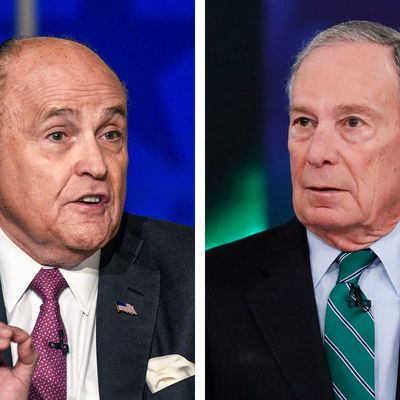
It hasn’t been long since the surprise announcement that Michael Bloomberg was filing as a Democratic candidate in next spring’s Alabama primary (that state was the first to have a filing deadline), but political observers are still trying to figure out how seriously to take the former New York mayor’s proto-presidential bid. Friday brought another data point on how he might run if he really does:
This “skip the early states” strategy was first tried by Al Gore in 1988. It didn’t work. When he ran again in 2000, and won the nomination, he trudged through Iowa and New Hampshire like everyone else had always done.
But the screw-the-early-states approach is most indelibly identified with Bloomberg’s mayoral predecessor, Rudy Giuliani, who was the early 2008 front-runner in multiple national polls before he let himself be talked into this disastrous strategy, as the Guardian observed at the time:
His team consisted of strategists, consultants and media specialists who had worked with him in New York or were Bush operatives from the 2004 uncontested primary campaign. Unlike the teams assembled by his rivals, they had not accumulated the years of experience of fighting ground wars in states like Iowa and New Hampshire. His Republican rivals took the traditional route that began on January 3 with the Iowa caucuses, moving on to primaries in New Hampshire and South Carolina, with sideshows in Michigan and Nevada.
Giuliani waited it out in Florida, assessing that taking the fourth most populous state in the country would outweigh wins in the early small states. He would then bounce forward to claim the other big states, including California, New York and New Jersey, on Super Tuesday, February 5. But by the time his rivals reached the Sunshine State, they had built up critical momentum, and Giuliani couldn’t catch up.
Giuliani was out of the race before January ended. And he was far more formidable, at least on paper, than Bloomberg is today.
Now it’s true that Bloomberg’s bankroll means anything he does to crash around in the nomination contest has to be taken somewhat seriously. And if crashing around (and maybe running a few billion dollars worth of ads against anti–Wall Street populists Sanders and Warren) is really all he has in mind, then there’s something to be said for avoiding those demanding early states — especially the snowy hinterlands of Iowa and New Hampshire. Perhaps Team Bloomberg wants to make sure he doesn’t wind up in the same situation that another New York mayor, Bill de Blasio, faced during an early Iowa trip last winter: stuck in a Super 8 motel in the middle of a blizzard, dining on a gas-station burrito. Billionaires don’t roll like that.
And presumably, under perfect circumstances, his dough could make him competitive on Super Tuesday, when most of his rivals won’t be able to afford huge ad buys in the vast media markets of California and Texas (plus significant states like Colorado, Massachusetts, Minnesota, North Carolina, Tennessee, and Alabama — where at least he’s getting his name out there).
The more fundamental problem for Bloomberg is that he, like Giuliani in 2008, really isn’t a great fit for his party (in his case, a recently adopted party). At a time when nearly all Democrats are deeply committed to criminal justice reform, holding financial institutions accountable for their policies, and protecting Social Security, Bloomberg is the champion of stop-and-frisk, a great defender of big banks, and someone who seems to believe in the false god of “entitlement reform.” Sure, he’s been great on gun control and more recently climate change, but he could continue to spend money on these causes without holding himself forth as a candidate. There’s just not much of a distinct constituency for him in the Democratic nominating contest. And so we all wonder: Is he serious?






























